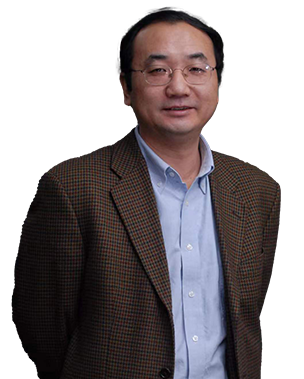Years pass by, and old events unfold (Part 11 of the serie
Editor's Note: During the fifteen years from 1986 to 2001, after arduous negotiations, China joined the World Trade Organization. Wang Lei, a lawyer from Gaopeng Law Firm, has been fully and deeply involved in the negotiation from the beginning and is a legal person in the negotiation delegation. This year marks the 20th anniversary of China's accession to the WTO. Lawyer Wang has written a series of articles on "The Legal Person and the Past of the WTO", recalling every bit of the eventful years. We also take this opportunity to pay tribute to those who stood at the forefront of reform and opening up and worked hard in the negotiations for the national interests.
In December 1993, the Uruguay Round of multilateral negotiations, which lasted nearly seven and a half years, ended as scheduled. After giving countries one year to complete the signing and approval procedures, the WTO is scheduled to be formally established on January 1, 1995, and the text of the agreement negotiated in the round will officially enter into force.
The end of the round of negotiations has brought profound changes to China's negotiations. China tried to restore its seat in the General Agreement on Tariffs and Trade (GATT), but the GATT was replaced by the WTO, so it decided to join the WTO. The reduction of tariffs and non-tariff barriers under the original framework of the General Agreement and the opening of the entry fees for the market of imported products are also far from enough. After entering the WTO, China needs to negotiate more issues with all parties, strengthen the protection of its intellectual property rights, open up China's service industry market, and allow foreign enterprises, companies Firms that invest in China or provide cross-border services from overseas. The scope and extent of market opening are so wide, and so many domestic departments are involved, making the negotiation of accession to the WTO even more difficult.
In April 1994, the General Agreement on Tariffs and Trade (GATT) held a ministerial meeting in Marrakech for the parties to formally sign the Uruguay Round Agreement. Marrakech, which means "red" in Arabic, is the ancient capital of Morocco, located on the edge of the Sahara Desert and a tourist attraction. The ancient city wall is named after the Arabic language red because it is made of a large number of ochre red rocks.
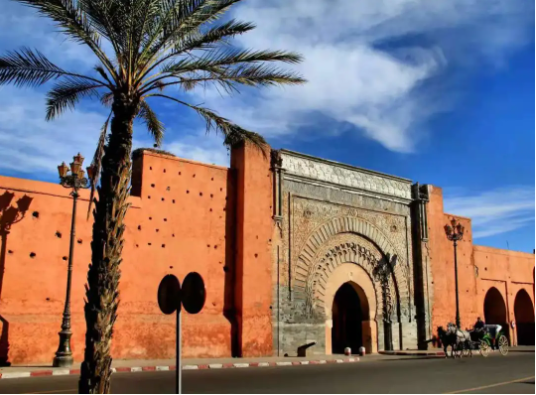
The picture is: Marrakech, the ancient capital of Morocco
As a comprehensive participant in the Uruguay Round, China was led by the third negotiator and Vice Minister Gu Yongjiang of the Ministry of Foreign Trade and Economic Cooperation to attend the Marrakech Ministerial Conference and sign the agreement text of the Uruguay Round. However, China's signature is only symbolic. Legally, the text will not take effect until China joins the WTO.
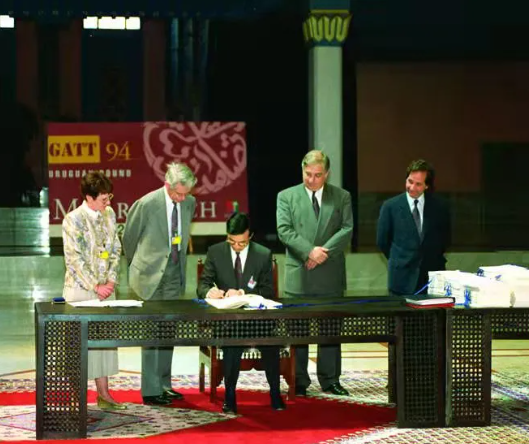
The picture shows Vice Minister Gu Yongjiang signing the text of the Uruguay Round negotiation agreement on behalf of the Chinese government under the witness of Director General Sutherland (second from right) and Director General's Special Adviser Linden (second from left)
In his early years, Minister Gu worked at the Chinese Embassy in Canada, and later he has been engaged in import and export business in foreign trade companies. He was the boss of China Machinery Import and Export Corporation. After stepping down as the third negotiator, he went to Hong Kong China Resources Group as the boss. Tanabe is thin and capable, elegant and humorous. He calls himself the team leader, while Long Yongtu is the coach (at that time, Long was the director and deputy head of the negotiating delegation). We are all players on the field. The Marrakech Ministerial Conference lasted for five days. In addition to signing the Uruguay Round agreement on behalf of the Chinese government, the Minister of the Valley arranged for other personnel to attend the meeting at the venue of the Ministerial Conference, while he held bilateral talks with the trade ministers of major countries to promote the conclusion of negotiations at the end of the year and strive to become a founding member of the WTO.
According to the division of labor, I will contact and arrange talks with the outside world. "Xiao Wang, make as many appointments as possible, and we can meet as many people as you can.". Minister Gu also struggled. The number of meetings was not capped. In the absence of a mobile phone or an embassy or consulate, the only way to contact the meeting is to rely on the phone number of the hotel where each delegation is staying in the conference manual. Morocco, the organizer of the conference, provided each delegation with a police car and a head of delegation car. Therefore, our special car, following the police cars on the way, shuttles back and forth every day in various hotels in the streets and alleys of Marrakech. After one game, I rushed to the next, exhausted after a few days. Finally, Minister Gu asked, "Xiao Wang, how many more people do we need to meet?" During the five day meeting, Minister Gu met with 24 ministers from 22 countries. The entire meeting was arranged without any mistakes. Marrakech, with its red city walls, grand plazas, Arab style bazaars, and ancient capital palace gardens, is impeccably visited, and it is worth visiting all the major hotels in the city.
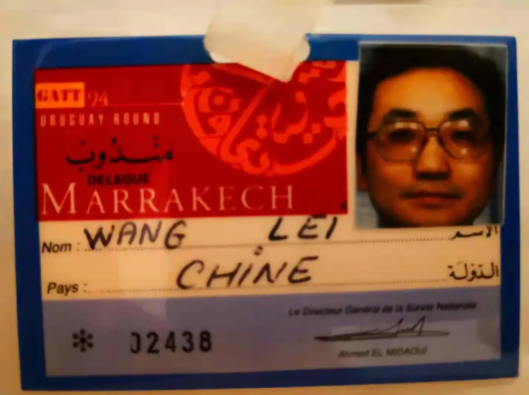
The picture shows the badge of the author attending the Marrakech Ministerial Conference
The Marrakech Conference sounded the rallying cry for China's negotiations, but it did not receive a response from the major countries led by the United States. They intended to raise prices in various fields, resulting in the subsequent months of negotiations without results. Christmas is still a few days away, and the last working group meeting of the GATT era has to announce that negotiations will continue after the establishment of the WTO next year. As usual, the Chinese delegation made the final statement at the meeting. Minister Gu introduced the tremendous efforts made by China for the negotiations, and thanked the members for their support, "The Chinese side expressed dissatisfaction with individual countries' deliberate obstruction of negotiations, lack of sincerity, and excessive pricing. It expressed disappointment that individual countries dominated the negotiations in the General Agreement, and the Chinese government expressed concern about whether the WTO could be free from interference from the willful actions of very few members in the future." These words refer to their style and tone, which are incompatible with the usual conventions of the General Agreement. "As soon as the tone of Gu Bu's speech fell and the venue was silent for a moment, Gillard, the chairman of the working group on stage, immediately looked around the venue, holding the meeting mallet, and said, 'If there is no further speaker, we will adjourn the meeting now.'" "Bang," and quickly began to drop the mallet. ".
It is rare in the GATT negotiations to directly criticize the United States without naming it to the point. After the meeting, many representatives walked to the seats of the Chinese delegation to express their support. The Indonesian ambassador shook Minister Gu's hand and said, "Only China can make such a point-to-point statement." The American representative looked embarrassed and did not come forward to shake hands with the Chinese representative as usual to say goodbye.
From July 1986 when the application for customs resumption was filed to December 1994, it took eight years for the China Working Group of the General Agreement on Tariffs and Trade (GATT) to hold a total of 19 meetings. China submitted numerous documents, answered thousands of questions, and conducted hundreds of consultations and negotiations, which ultimately failed. However, from the future pattern of opening up the market to the framework of China's rights and obligations, as well as the corresponding draft legal documents, the eight years of negotiations have already laid a solid foundation for work, and the follow-up is only about the amount of bidding within this framework.
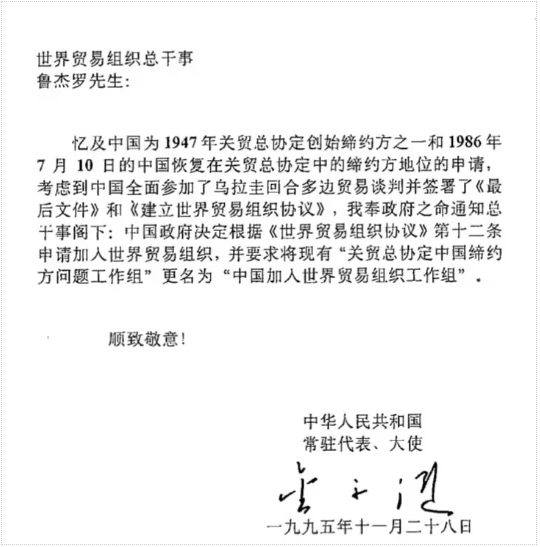
The picture shows the application letter for China's accession to the WTO
In November 1995, Ambassador Jin Yongjian of China to Geneva submitted an application on behalf of the Chinese government for China's accession to the WTO. The Working Group on China's General Agreement was renamed the Working Group on China's Entry into the WTO. The Chairman of the Working Group remains the same, and the Chinese negotiating delegation was appointed as the fourth negotiating representative by Long Yongtu, Vice Minister of the Ministry of Foreign Trade and Economic Cooperation. Unlike the previous three "airborne" negotiators, Long is a "native" born in the negotiating delegation. As the Director of the International Division specifically responsible for negotiating affairs, he has been a core member of the negotiating delegation for many years, and was once the deputy of the negotiators, Minister Tong and Minister Gu. In the following years, as the chief negotiator of China, Minister Long tenaciously advanced the negotiations with loyalty and wisdom, self-confidence and perseverance, determination and responsibility, centering on promoting China's reform and opening up, and taking joining the world trading system as his own responsibility. Nearly seven years after the establishment of the WTO, China finally joined the World Trade Organization on December 11, 2001, becoming the 143rd member of the WTO.
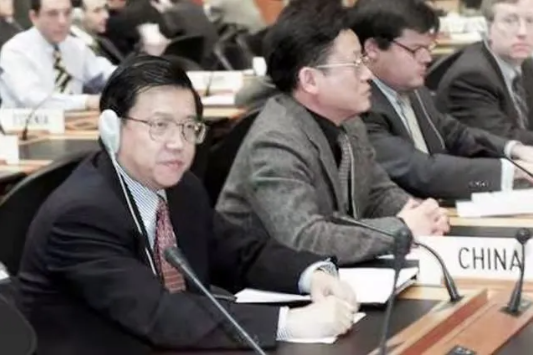
Picture: Long Yongtu, China's fourth negotiator and Vice Minister of Foreign Trade and Economic Cooperation
To be continued
(This article is translated by software translator for reference only.)
Related recommendations
- Tax lawyers review the draft of the revised Tax Collection and Administration Law for soliciting opinions
- New Measures for Punishing "Dishonesty" by the Supreme People's Court at the Two Sessions in 2025 (Part 3): "Height Limit" Single Release Mechanism
- New Measures for Punishing "Dishonesty" by the Supreme People's Court at the Two Sessions in 2025 (Part 2): Grace Period System
- Interpretation of the Management Measures for Compliance Audit of Personal Information Protection - Feeling the Rhythm and Rhythm of Regulatory Flow


